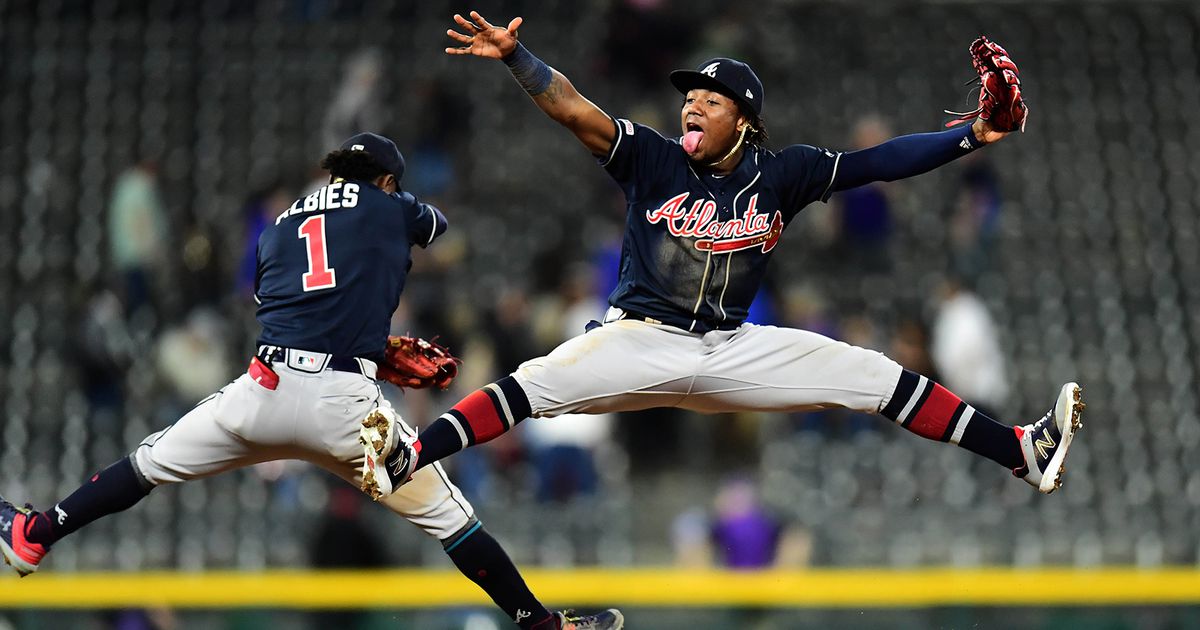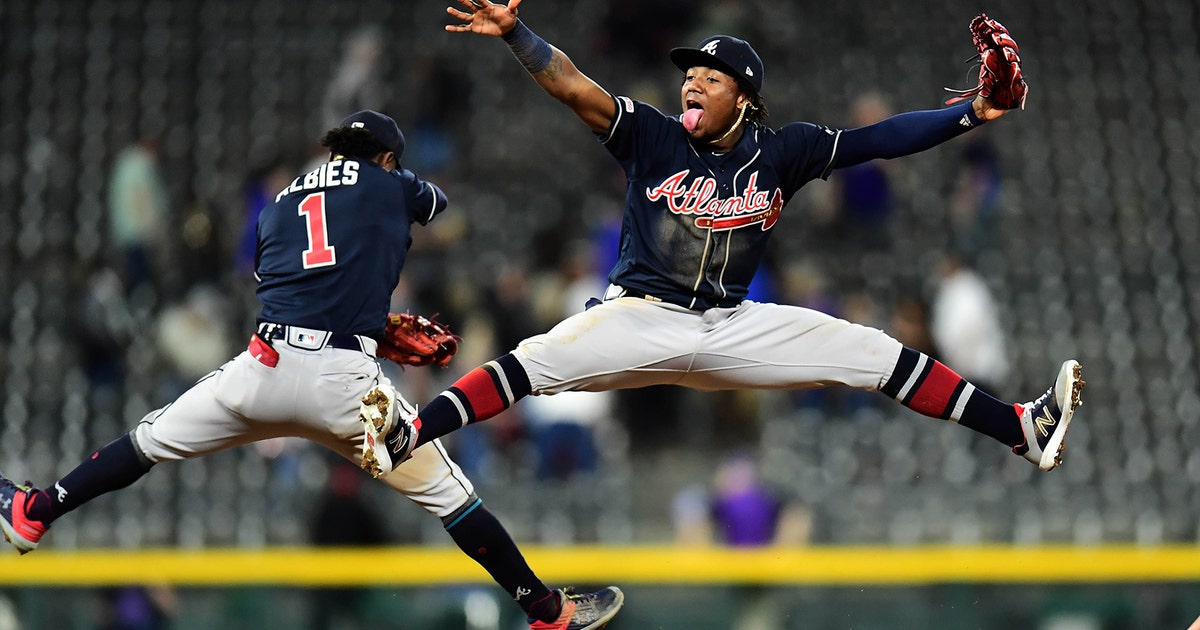Three Cuts: Ronald Acuña Jr., Ozzie Albies extensions cement Atlanta’s long-term foundation


Atlanta’s long-term foundation is ultra-young, ultra-affordable and ultra-talented
Ronald Acuña Jr. and Ozzie Albies are going to be playing together in Atlanta for a decade.
The under-23 stars shook the baseball industry over the past two weeks with extensions that both provide financial security to the players and their families and hand an incredible amount of, yes, financial flexibility to the Braves’ front office for the next decade. Albies and Acuña signed for rates far below their free-market value — to claim otherwise would be foolish — and the two deals will likely be a source of contention for years as the new collective bargaining agreement creeps closer. From an Atlanta-centric perspective, though, the two players appear satisfied with their decisions as the focus now turns to how the organization wields that extra room on the payroll.
The franchise will pay $4 million per season for both players over the next three years. Repeat: $4 million combined average annual value through 2021 for two players who will likely hit at the top of the order, provide plus defense and base-running and be the marketable dynamic duo of a prospective contender.
From 2022 to 2027, assuming club options are exercised, Albies and Acuña will make a combined salary equal to the one the Braves paid Adrian Gonzalez to not play for them in 2018 dollars. Atlanta could then pick up yet another $17 million club option for Acuña’s 2028 campaign.
If both players produce anywhere near their 7.7 combined fWAR last season, this resets the gold standard front offices around the league will try to replicate for years. As Dan Szymborski wrote for FanGraphs after the Albies extension: “ZiPS projects Albies with the fourth-most WAR remaining in his career, behind only Mike Trout, Juan Soto and Francisco Lindor. If you’re wondering where Ronald Acuña is, he’s all the way down at … fifth.”
Surplus value is practically guaranteed to eclipse the $100 million plateau. It’s likely closer to half a billion.
Since 2000, no team has locked up two star position players who debuted this young to this many years of club control without committing any money past their respective age-30 seasons. This is unprecedented value in modern baseball. While it is too soon to tell what the final financial tally — either in terms of arbitration or extension dollars that have yet to materialize for one or both players — will be for other young standout duos around the sport like Francisco Lindor-Jose Ramirez, Mookie Betts-Xander Bogaerts, Corey Seager-Cody Bellinger, Carlos Correa-Alex Bregman or Javy Baez-Kris Bryant, Atlanta knows exactly what the commitment will be for its two most promising position players.
Finding similar situations in recent history is difficult, if not impossible. Here is a compilation of star duos (a subjective term, granted) who debuted at 22 years old or younger for the same franchise around the same time with one or both position players signing an extension since 2000.
Joe Mauer-Justin Morneau, Twins
Commitment through age-30 seasons: $186M
Commitment after age-30 seasons: $115M
Production through age-30 seasons: 65.1 bWAR
Background: The Twins signed superstar catcher Joe Mauer to two extensions (2007, 2010) during his outstanding career in Minnesota, the second of which remains the most lucrative extension ever given to a catcher, while Morneau signed a six-year, $80 million deal in 2008. The two combined to win two MVP awards and Mauer spent an entire Cooperstown-quality career in Minneapolis. The small-market Twins never made it past the ALDS but, save for a couple seasons toward the end, the contracts never truly went sideways.
David Wright-Jose Reyes, Mets
Commitment through age-30 seasons: $101M
Commitment after age-30 seasons: $0M*
Production through age-30 seasons: 76.6 bWAR
Background: The David Wright financial situation makes this a difficult case. While the Mets did not technically guarantee any money past his age-30 season with his first extension in 2006, he signed his second extension less than a month before his 30th birthday. The Mets paid the star third baseman another nine digits over the subsequent eight seasons before health issues unfortunately intervened, leaving a complicated web of deferrals and interest remaining. Reyes signed a far less lucrative extension, eventually becoming a free agent after the 2011 season, but its easy to forget how good the left side of New York’s infield was for a time.
Christian Yelich-Giancarlo Stanton, Marlins
Commitment through age-30 seasons: $165M
Commitment after age-30 seasons: $218M
Production through age-30 seasons: 64.8 bWAR
Background: The Marlins outfielders provide a lesson in trade value. Miami traded their two stars prior to last season for very different packages due to the team-friendly nature of Yelich’s deal — netting them a decent return from the Brewers — and Stanton’s monster deal, an extension topped in value only by Mike Trout’s. Still, even though Miami will never see the full return on their franchise’s initial investment, the lives of the contracts themselves have already seen two MVP awards and could end up with the highest on-field production on this list, especially with the way the 27-year-old Yelich has played for the Brewers.
Freddie Freeman-Jason Heyward, Braves
Commitment through age-30 seasons: $128M
Commitment after age-30 seasons: $22M
Production through age-30 seasons: 63.4 bWAR
Background: The Atlanta Braves committed long-term to one of their two young stars (Freeman) and bought out the arbitration years before eventually trading the other (Heyward), a deal that set off a ripple effect eventually leading to the Shelby Miller blockbuster. Freeman blossomed into one of the game’s most consistent superstars after signing the most lucrative contract in franchise history. Heyward eventually signed his own mega-deal with the Chicago Cubs, but the combination of the financial commitment, the money tied up past age-30 campaigns and production might make this the closest comparable situation to Atlanta’s latest extension spree — assuming a comparison even exists.
Ozzie Albies-Ronald Acuña Jr., Braves
Commitment through age-30 seasons: $135M
Commitment after age-30 seasons: $0M
Production through age-30 seasons: 11.1 bWAR
Background: The bargain of all bargains until proven otherwise. Factoring in four club options (not included in the commitments above outside of buyouts), Atlanta claims club control over two of the game’s brightest young stars for 21 combined seasons at $170 million. That’s within range of the eight-year deal Chris Davis signed in 2016.
The remaining question will be how Atlanta’s front office surrounds its youthful foundation for the next decade and if, at some point, the combination adds up to the organization’s second World Series title.
Jason Getz






